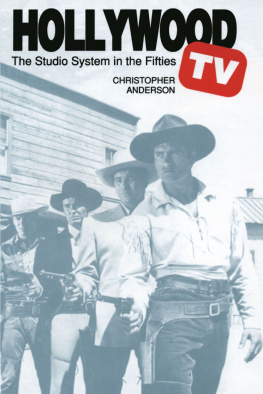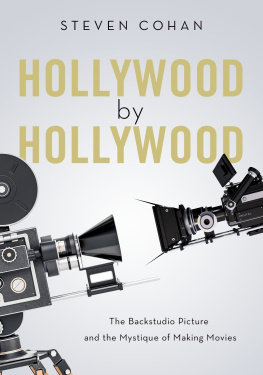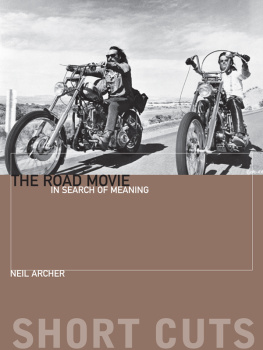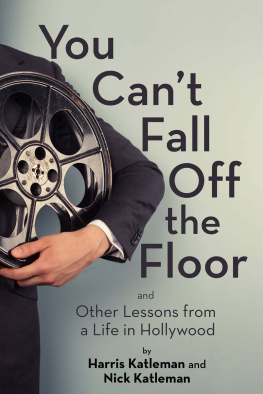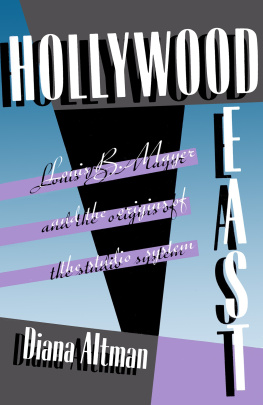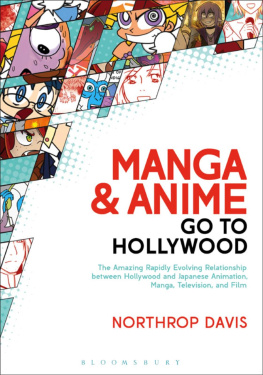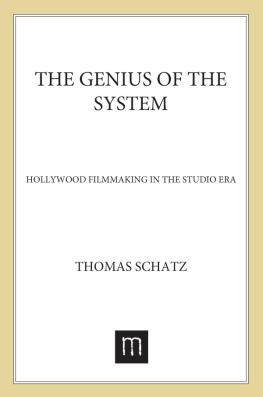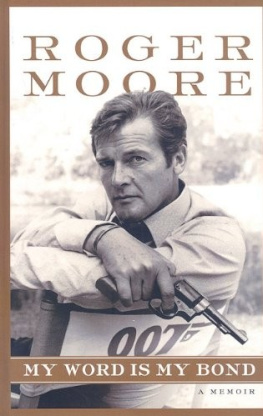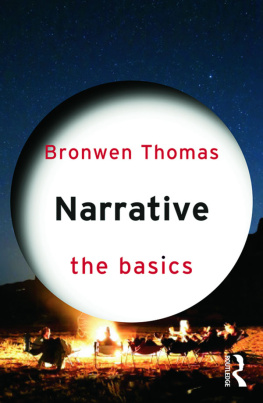Christopher Anderson - Hollywood TV: The Studio System in the Fifties
Here you can read online Christopher Anderson - Hollywood TV: The Studio System in the Fifties full text of the book (entire story) in english for free. Download pdf and epub, get meaning, cover and reviews about this ebook. year: 1994, publisher: University of Texas Press, genre: Romance novel. Description of the work, (preface) as well as reviews are available. Best literature library LitArk.com created for fans of good reading and offers a wide selection of genres:
Romance novel
Science fiction
Adventure
Detective
Science
History
Home and family
Prose
Art
Politics
Computer
Non-fiction
Religion
Business
Children
Humor
Choose a favorite category and find really read worthwhile books. Enjoy immersion in the world of imagination, feel the emotions of the characters or learn something new for yourself, make an fascinating discovery.
- Book:Hollywood TV: The Studio System in the Fifties
- Author:
- Publisher:University of Texas Press
- Genre:
- Year:1994
- Rating:5 / 5
- Favourites:Add to favourites
- Your mark:
- 100
- 1
- 2
- 3
- 4
- 5
Hollywood TV: The Studio System in the Fifties: summary, description and annotation
We offer to read an annotation, description, summary or preface (depends on what the author of the book "Hollywood TV: The Studio System in the Fifties" wrote himself). If you haven't found the necessary information about the book — write in the comments, we will try to find it.
This pioneering study offers the first thorough exploration of the movie industrys shaping role in the development of television and its narrative forms.
Hollywood TV: The Studio System in the Fifties — read online for free the complete book (whole text) full work
Below is the text of the book, divided by pages. System saving the place of the last page read, allows you to conveniently read the book "Hollywood TV: The Studio System in the Fifties" online for free, without having to search again every time where you left off. Put a bookmark, and you can go to the page where you finished reading at any time.
Font size:
Interval:
Bookmark:
HOLLYWOOD TV
The Studio System in the Fifties
by Christopher Anderson

UNIVERSITY OF TEXAS PRESS
AUSTIN
Copyright 1994 by the University of Texas Press
All rights reserved
First edition, 1994
Requests for permission to reproduce material from this work should be sent to Permissions, University of Texas Press, Box 7819, Austin, TX 78713-7819.
Library of Congress Cataloging-in-Publication Data
Anderson, Christopher, 1960
Hollywood TV : the studio system in the fifties / by Christopher Anderson.
p. cm. (Texas film studies series)
Includes bibliographical references and index.
ISBN 0-292-73059-4. ISBN 0-292-70457-7 (PBK.)
1. TelevisionUnited StatesProduction and direction. 2. Motion picture studiosCaliforniaLos AngelesHistory. 3. Motion pictures and televisionUnited States. I. Title. II. Series.
PN1992.75.A49 1994
384.55'4'097309045dc20
93-37276
ISBN 978-0-292-78460-4 (library e-book)
ISBN 978-0-292-75953-4 (individual e-book)
DOI: 10.7560/730595
To Sharon and Calvin Anderson
Acknowledgments
By guiding me through the Warner Bros. and David O. Selznick archives, several people made it possible to conceive of a book about television production in 1950s Hollywood. I would like to thank Charles Bell, Prentiss Moore, and Steve Wilson of the Harry Ransom Humanities Research Center, University of Texas, Mary Anne Jensen of the Firestone Library, Princeton University, and particularly Leith Adams of the Department of Special Collections, University of Southern California, who shared his knowledge of the Warner Bros. collection and provided many valuable ideas about TV production at the studio. I would like to thank Madeline F. Matz at the Library of Congress. I also would like to thank those who worked at Warner Bros. Television and who graciously agreed to take time to talk with me about their experiences: William T. Orr, Roy Huggins, Hugh Benson, Harry Tatleman, Richard Bare.
I am indebted to friends and teachers from the University of Texas for providing the inspiration to begin writing this book. I would like to thank Joli Jensen, Janet Staiger, and Douglas Kellner for their comments on early versions of the manuscript. Horace Newcomb first encouraged me to write about television; his advice and support over the years have been invaluable. I am grateful also to many friends who have continued to share ideas and moral support, though we are now scattered across the country: Jeff Sconce, Mark Alvey, Hilary Radner, John Gibson, Jim Wehmeyer, Barbara Wehmeyer, Mark Fenster, Steve Lee, Steve Fore, and James Hay.
I am also indebted to friends, students, and colleagues at Indiana University, where I completed the book. I have received valuable support from my colleagues in the Department of Telecommunications, especially Don Agostino and Kathy Krendl, who as successive departmental chairs encouraged this project in countless ways. Through their patience and generosity, Beverly Stoeltje, Richard Bauman, James Naremore, and Barbara Klinger have provided the supportive environment that is essential to the writing process. Michael Curtin has spent endless hours discussing this project with me and has read the manuscript at several stages in its development. His thoughtful criticism and enthusiasm for the project have made my task easier.
I have benefited from the patience and support of Frankie Westbrook, my editor at the University of Texas Press. I am most deeply indebted to series editor Tom Schatz, who literally has been involved in this project since its first moment of existencewhen he introduced me to the Warner Bros. archives. Since that time this manuscript, in one form or another, has accompanied him across the globe, from the floor of the Grand Canyon to the shores of the Baltic. We have covered many miles during our ongoing conversation about Hollywood and televisionnever more literally than during an exhausting all-night transatlantic flightyet his commitment to the project has never wavered. I could not have written this book without him.
Finally, Id like to thank Rachael Stoeltje. While others read the finished product, she lived through the process. Only a strong person would prefer the latter.
I
Introduction: Hollywood in the Home
The transformation of the American motion picture industry following World War II has been viewed as a rupture, a crisis so grave that it forced the major studios to abandon or adulterate many of the practices that had virtually defined the Hollywood studio system since the 1920s. For those who worked within the film industry, the decade of the 1950s has been depicted as the decline and fall of an empire, a time of bewilderment in New York boardrooms and panic on Hollywood backlots. Screenwriter Robert Ardrey has described a scene in the exclusive Green Room at the Warner Bros. commissary during this era. Fresh from examining the latest sagging box office figures, Jack Warner burst into the dining hall, jabbing at contract producers and writers as they ate their lunches. I can do without you! And you! And you! I can do without you! he exclaimed as he strode defiantly among the tables. Suddenly face to face with Jerry Wald, by far the studios most successful producer, Warner paused for an instant and then shouted, I can almost do without you!
While such tales of temporary madness are probably apocryphal, they have fascinated fans, scholars, and even those who participated in the events, coloring memories of the era and shaping historical accounts. When once-powerful industry leaders such as Darryl Zanuck, Louis B. Mayer, and David O. Selznick fell from grace in the industrial reorganization of the 1950s, they perceived their enforced exile in epic terms, as a barbaric attack on Hollywoods glorious tradition. Selznick, in a letter to his friend and former partner John Hay Whitney, depicted the 1950s as the movie industrys Dark Ages: Our old stomping ground, what is laughingly known as the motion picture industry, is very mixed up and unhappy. Whatever the weakness of the old and rugged pioneers, who are all disappearing from the scene almost simultaneouslywhat a hardy race they were!their
Since stories of imperial decay draw their strength from nostalgia, it is no wonder that television, the eras new technology of mass entertainment, often played the antagonist in the mythic version of Hollywoods postwar crisis. And while television was not the sole cause of the changes that took place in Hollywood during the late 1940s and early 1950s, one can appreciate the movie industrys reported hostility toward a medium that threatened to displace the motion picture as the preeminent cultural commodity in twentieth-century America. Most hostile were the studio bosses; indeed, tales of Jack Warners early animosity toward television are legendary. Studio personnel say that during the early 1950s Warner delivered an edict to producers at his studio, forbidding them to include television sets in the decor of Warner Bros. films. From our vantage point in a world saturated by television, it is hard to believe that a TV set could trigger such desperate measures from one of Hollywoods most venerable moguls, yet Warner was scarcely alone in voicing his animosity toward the industrys emergent competitor.
Throughout the early 1950s, the industry trade press debated whether television ultimately would reveal itself to be friend or foe of the movie studios. As television began its unprecedented expansion following World War II, revenues throughout the motion picture industry plunged dramatically. Warner Bros. suffered some of the worst losses, with net profits falling from a record $22 million in 1947 to $2.9 million in 1953a decline of nearly 90 percent in just six years. Under conditions that threatened the very existence of the studio system, television served many in the Hollywood community as a convenient stock villain.
Next pageFont size:
Interval:
Bookmark:
Similar books «Hollywood TV: The Studio System in the Fifties»
Look at similar books to Hollywood TV: The Studio System in the Fifties. We have selected literature similar in name and meaning in the hope of providing readers with more options to find new, interesting, not yet read works.
Discussion, reviews of the book Hollywood TV: The Studio System in the Fifties and just readers' own opinions. Leave your comments, write what you think about the work, its meaning or the main characters. Specify what exactly you liked and what you didn't like, and why you think so.

